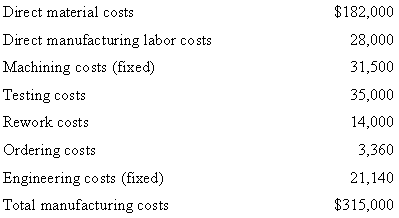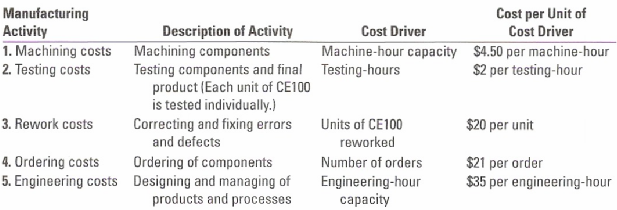Question: Target prices, target costs, value engineering, cost incurrence, locked-in costs, activity-based costing. Cutler Electronics makes a radio-cassette player, CE100, which has 80 components. Cutler sells
Target prices, target costs, value engineering, cost incurrence, locked-in costs, activity-based costing. Cutler Electronics makes a radio-cassette player, CE100, which has 80 components. Cutler sells units each month for $70 each. The costs of manufacturing CE100 are $45 per unit, or $315,000 per month. Monthly manufacturing costs incurred are:

Cutler’s management identifies the activity cost pools, the cost driver for each activity, and the cost per unit of the cost driver for each overhead cost pool as follows:

Cutler’s management views direct material costs and direct manufacturing labor costs as variable with respect to the units of CEI0O manufactured. Over a long-run horizon, each of the overhead costs described in the preceding table varies, as described, with the chosen cost drivers.
The following additional information describes the existing design:
a. Testing and inspection time per unit is 2.5 hours.
b. 10% of the CE100s manufactured are reworked.
c. Cutler places two orders with each component supplier each month. Each component is supplied by a different supplier.
d. It currently takes 1 hour to manufacture each unit of CE100.
In response to competitive pressures, Cutler must reduce its price to $62 per unit and its costs by $8 per unit. No additional sales are anticipated at this lower price. However, Cutler stands to lose significant sales if it does not reduce its price. Manufacturing has been asked to reduce its costs by $6 per unit. Improvements in manufacturing efficiency are expected to yield a net savings of $1.50 per radio-cassette player, but that is not enough. The chief engineer has proposed a new modular design that reduces the number of components to 50 and also simplifies testing. The newly designed radio-cassette player, called “New CE100” will replace CE100.
The expected effects of the new design are as follows:
a. Direct material cost for the New CE100 is expected to be lower by $2.20 per unit.
b. Direct manufacturing labor cost for the New CE100 is expected to be lower by $0.50 per unit
c. Machining time required to manufacture the New CE100 is expected to be 20% less, but machine- hour capacity will not be reduced.
d. Time required for testing the New CE100 is expected to be lower by 20%.
e. Rework is expected to decline to 4% of New CE100s manufactured.
f. Engineering-hours capacity will remain the same.
Assume that the cost per unit of each cost driver for CE100 continues to apply to New CE100.
1. Calculate Cutler’s manufacturing cost per unit of New CE100.
2. Will the new design achieve the per-unit cost-reduction targets that have been set for the manufacturing costs of New CE100? Show your calculations.
3. The problem describes two strategies to reduce costs: (a) improving manufacturing efficiency and (b) modifying product design. Which strategy has more impact on Cutler’s costs? Why? Explain briefly.
Direct material costs $182,000 Direct manufacturing labor costs 28,000 Machining costs (fixed) 31,500 Testing costs 35,000 Rework costs 14,000 Ordering costs 3,360 21,140 Engineering costs (fixed) Total manufacturing costs $315,000
Step by Step Solution
3.34 Rating (172 Votes )
There are 3 Steps involved in it
Target prices target costs value engineering cost incurrence lockedin cost activitybased costing 1 Note 1 10 of old CE100s are reworked That is 700 10 ... View full answer

Get step-by-step solutions from verified subject matter experts
Document Format (1 attachment)
24-B-C-A-C-B-M (71).docx
120 KBs Word File


